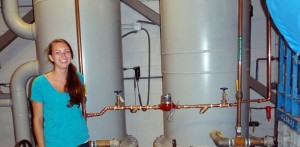Engineering student’s design reduces NC State water use

NC State will save up to 5 million gallons of water per year thanks to a water recovery project designed by a student intern working at the university’s Cates Central Utility Plant.
This summer Blake Henard, a mechanical engineering student at the University of South Carolina, came home to Raleigh to work at NC State, where her father is a professor in the Poole College of Management. Based at Cates Central Utility Plant, which utilizes highly-efficient cogeneration technology to produce electricity and steam for main campus, Henard figured out a way to recover water runoff from the cogeneration plant and recycle it back into the facility’s chilled water plant, resulting in significant water and cost savings.
After researching and measuring the potential water flow from each runoff site, Henard designed a piping and metering system to redirect otherwise wasted water into the chilled water plant’s condenser system. Henard’s design utilizes gauges, meters and valves to measure water flow, allow isolation of water when routine maintenance is needed and prevent equipment damage through automatic water redirection.
“This greatly enhanced my learning experience as a student,” Henard said. “Without this internship I would not have had the opportunity to design, lead and manage an entire project as large as this one.”
Because the system operates solely on city water pressure and requires no operator interaction, the project will provide up to $30,000 per year in cost savings, according to NC State’s Plant Engineer Erik Hall.
“Beyond the numbers, though, we have to consider the exponential ripple effect these projects can have on our campus, community, state and beyond,” Hall said. “By having students participate in these projects, we can help NC State foster a new generation of engineers that consider not just making things or making them better but making them in sustainable ways.”